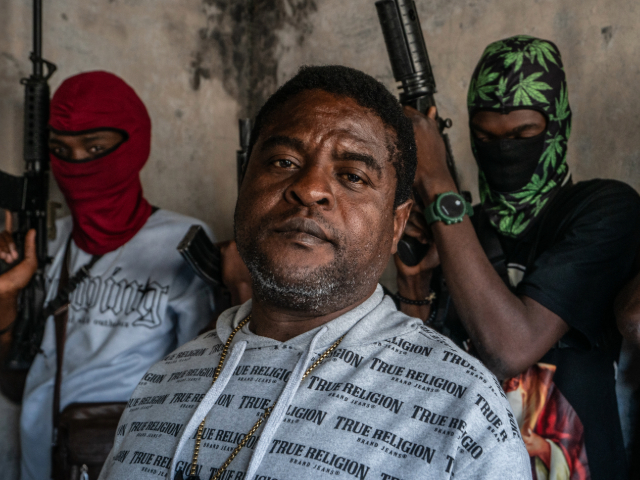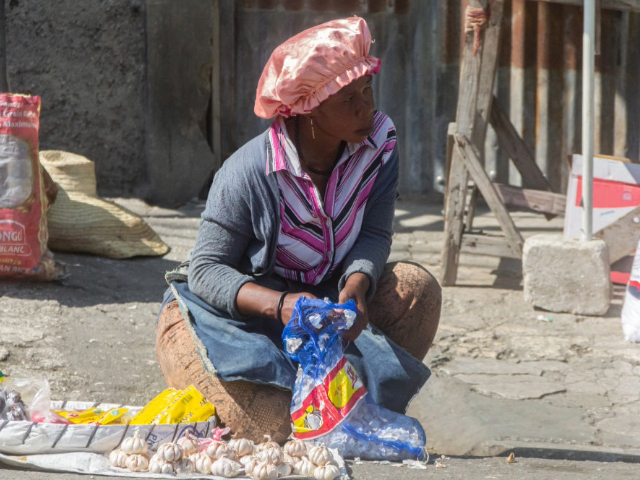International humanitarian experts said on Friday that Haiti’s gang war has pushed food insecurity to record levels in the long-suffering country, with conditions very close to the technical definition of famine reported in several areas.
Integrated Food Security Phase Classification (IPC), a multi-partner initiative established in 2004 to measure and quantify food insecurity, raised the alarm. IPC produces reports that governments, non-governmental agencies, and charities around the world use to determine the need for food assistance.
IPC’s latest alert for Haiti cited the high number of internally displaced persons (IDPs), especially the thousands driven from the capital city of Port-au-Prince by gang violence, as a major factor in the rising hunger crisis. The report also blamed “low agricultural production due to below-normal rainfall” and “the lack of previously planned humanitarian aid.”

Gang leader Jimmy “Barbecue” Cherizier with G-9 federation gang members in the Delmas 3 area on February 22, 2024, in Port-au-Prince, Haiti. (Giles Clarke/Getty Images)
“The current update shows a stark deterioration of food security in Haiti, with 532,000 additional people experiencing acute food insecurity compared to previous estimates for this season,” the report said.
IPC said that 4.97 million of Haiti’s 11.5 million people are now facing crisis levels of food insecurity, with eight areas sinking to the “emergency phase,” the worst status before an outright famine is declared.
One of the near-famine regions is the Artibonite Valley, the heart of Haiti’s agricultural industry. Violent gang members swarming out of Port-au-Prince have overrun the valley, deliberately targeting farmers and their families for kidnapping and execution because each gang hopes to starve out its rivals.
The United Nations warned in November:
Ransom payments, theft of crops and livestock and destruction of irrigation canals have forced over 22,000 people to flee their villages and seek refuge in the region’s urban centers. The aggravating effects of this situation are already being felt in Lower Artibonite, where by September 2023 over 45% of the population was living in a situation of acute food insecurity.
The U.N. described the gangsters plaguing the Lower Artibonite Valley as “extremely violent” and willing to execute civilians without hesitation. The gangs burn down villages perceived as belonging to their rivals, execute prisoners by setting them on fire, and use sexual violence “as a weapon against women and even young children.”
The World Food Program (WFP) warned on March 12 that it can no longer keep pace with rising food insecurity in Haiti.
“Our humanitarian operation in Haiti is running on fumes, with funding for hot meals about to run out in two weeks. We need donors to step up today so we can tackle the rising tide of hunger and halt the slide into chaos,” said WFP Executive Director Cindy McCain.
Jean-Martin Bauer, WFP’s country director for Haiti, added:
Haiti is one of the world’s most severe food crises – 1.4 million Haitians are one step away from famine. This crisis has been largely unaddressed. WFP is on the ground and responding, but we need consistent and safe access to deliver assistance to people who need it.
Jean Marc deMatteis, the CEO of Haiti’s vital Hospital Albert Schweitzer, told ABC News on Wednesday that since gangs have effectively shut down Haiti’s sea- and airports, “there is now real concern that Port-au-Prince could actually run out of food and other essential supplies.”
Laurent Uwumuremyi, head of Haiti operations for an aid group called Mercy Corps, told the UK Daily Mail on Monday that gangs now control 90 percent of Port-au-Prince, making it all but impossible to distribute food and medicine even when supplies reach the city.
A woman walks past burning tires during a demonstration following the resignation of Haitian Prime Minister Ariel Henry in Port-au-Prince, Haiti, on March 12, 2024. (CLARENS SIFFROY/AFP via Getty))
“Even in areas like Petion-Ville, an upscale neighborhood that until recently was considered safe, the population has been barricaded indoors,” Uwumuremyi said. “If the situation deteriorates without any efforts to address the unfolding humanitarian crisis, Port-au-Prince will soon find itself completely overwhelmed.”
Haiti has been overwhelmed by an outburst of gang violence ever since Prime Minister Ariel Henry left the country on a trip to Kenya in early March to negotiate a deal for Kenya to spearhead an international security intervention. Henry, whom much of the Haitian population views as illegitimate, was unable to return after his Africa trip due to escalating violence.
Ariel Henry (VALERIE BAERISWYL/AFP via Getty Images)
On March 11, Henry said he would resign “immediately” after the creation of a “transitional council” to establish a new government. Efforts to establish such a council have been unsuccessful so far, in part because the gangs have threatened to kill many of the prospective members.
